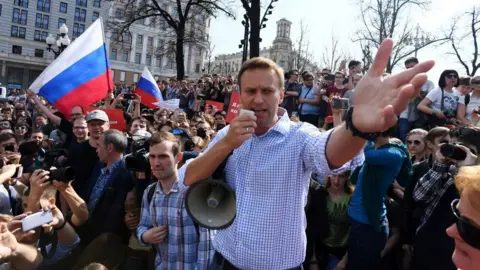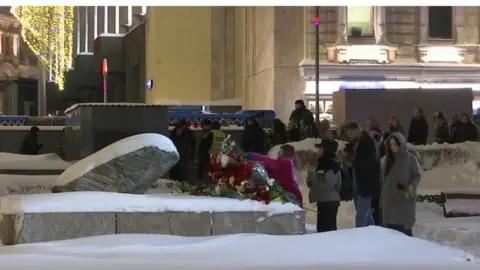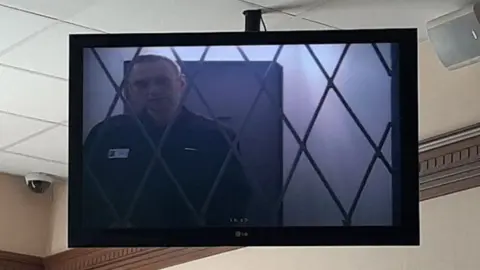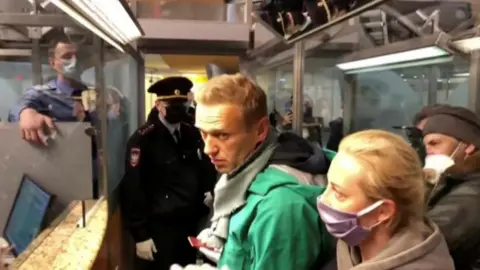By Paul KirbyBBC News

 KIRILL KUDRYAVTSEV/AFP
KIRILL KUDRYAVTSEV/AFPRussia’s most significant opposition leader for the past decade, Alexei Navalny, has died in an Arctic Circle jail, the prison service has said.
President Vladimir Putin’s most vociferous critic, he was serving 19 years on extremism charges that were widely seen as politically motivated.
Navalny was moved to one of Russia’s toughest penal colonies late last year.
His wife Yulia has appealed to the international community “to help punish this regime”.
One of his closest allies, Anti-Corruption Foundation chief Ivan Zhdanov, said it was “highly likely” Navalny had been killed and that a “murder had actually happened”.
The prison service in Russia’s Yamalo-Nenets district where Navalny was being held said he had “felt unwell” after a walk on Friday.
He had “almost immediately lost consciousness”, it said in a statement, adding that an emergency medical team had immediately been called and tried to resuscitate him but without success.
“The emergency doctors declared the prisoner dead. Cause of death is being established.”
Hours later, a steady stream of Muscovites laid flowers at a monument to victims of political repression opposite the Lubyanka, once home to Russia’s notorious KGB spy service.


Prosecutors have warned Russians not to join any mass protests.
Navalny, 47, was last seen only one day before his death, looking well and laughing during a court hearing via video link.
Yulia Navalnaya took to the stage at the Munich Security conference on the verge of tears, with a warning that the news had only come from unreliable state sources.
“But if it’s true, I know Putin, all his allies, all his friends, all his government know they will be held responsible for what they’ve done… and this day will come sooner than you think.”
His mother Lyudmila Navalnaya was quoted as saying: “I don’t want to hear any condolences. We saw him in prison on the 12th [February], in a meeting. He was alive, healthy and happy.”
Navalny’s close aide Leonid Volkov cautioned that there was no way to confirm what had happened but said the prison authorities’ statement amounted to a confession that they had killed him.

 @teamnavalny
@teamnavalnyThere was minimal coverage on Russia’s state TV channels, although one report by RT suggested Navalny had suffered a blood clot.
That was ridiculed by Moscow specialist Alexander Polupan, who had treated Navalny in the past. He said that kind of diagnosis could only be made from a post-mortem examination.
Within minutes of Navalny’s death being announced by the prison service, the international community hailed the courage of Vladimir Putin’s biggest domestic adversary.
France said he had paid with his life for resisting Russian “oppression”, while Norway’s foreign minister said Russian authorities bore a great responsibility for his death.
US Secretary of State Antony Blinken said in Munich that if the reports were accurate “his death in a Russian prison and the fixation and fear of one man only underscores the weakness and rot at the heart of the system that Putin has built”, adding that “Russia is responsible for this”.
Mr Putin’s spokesman, Dmitry Peskov, said merely that Navalny’s death had been “reported to the president”, who was on a visit to the city of Chelyabinsk. “Medics must somehow figure this out,” Mr Peskov said.
UK Foreign Minister David Cameron said “no-one should be in any doubt about the dreadful nature of Putin’s regime in Russia after what has just happened”.
Most of the Russian president’s critics have fled Russia, but Alexei Navalny returned in January 2021, after months of medical treatment. In August 2020 he was poisoned at the end of a trip to Siberia with a Novichok nerve agent.
His team succeeded in flying him out to Germany for specialist treatment and on his return to Moscow he was immediately taken into custody. He had been accompanied on the flight from Germany by his wife Yulia Navalnaya, embracing her at passport control before being led away.
He would never leave jail again in the next 37 months.

 Reuters
ReutersHis last Instagram post to his wife two days ago said there were thousands of kilometres between them “but I feel that you are near every second”. He leaves two children, Dasha, who is studying in the US and Zakhar, who is still at school.
Navalny, who was 47, had long sought to challenge Vladimir Putin at the ballot box, but he was barred from running in the 2018 presidential election. Next month, Russia’s leader will stand unchallenged by any meaningful opposition.
Anti-war candidate Boris Nadezhdin was banned from standing in the election because of supposed irregularities found in the thousands of signatures submitted in support of his candidacy.
Navalny, whose opposition began in the form of an anti-corruption campaign, is the latest in a string of prominent Russian figures who have died while challenging Vladimir Putin’s rule.
Opposition leader Boris Nemtsov was shot dead on a Moscow bridge a stone’s throw from the Kremlin in 2015, and Wagner boss Yevgeny Prigozhin was killed in August 2023 in an unexplained plane crash weeks after leading his mercenaries in an armed mutiny.
Yet Navalny repeatedly laughed off his friends’ concerns for his health. He was moved from a penal colony east of Moscow in December and was not seen for weeks until he reappeared in a penal colony in the Arctic town of Kharp.
Navalny said he had been taken on a 20-day trip around Russia, telling reporters during a court appearance by video that his conditions were “much better” than in his previous penal colony in Vladimir.
However, he was repeatedly punished by his prisons with solitary confinement. His spokeswoman Kira Yarmysh said last month he had spent more than 280 days in isolation.
Navalny had not been due to leave prison until his 70s, because of his most recent conviction for extremism last August. It was his third jail sentence and supporters accused the Kremlin of trying to silence him for good.
Russian human rights activist and journalist Eva Merkacheva said on Friday that he had been placed in solitary confinement at least 27 times, saying it “could not but play a role” in his death.
In such extreme conditions doctors knew that such punishment was very harmful to the human body, so under the law no-one could be given more than 15 days in isolation, she said.
This post was originally published on this site be sure to check out more of their content.








